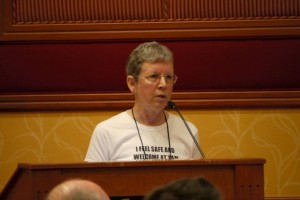Alex Gabriel has an excellent, thorough, detailed, courteous reply to Paula Kirby.
He makes an important point at the beginning that has been steadfastly ignored both by Paula and by many of her supporters in this dispute.
I know that, as I think your letter hints, feminist skeptics including at FreethoughtBlogs have disagreed with you before and may have been barbed. But I’d like to point out those comments were always qualified: PZ said FtB was criticised ‘by no less a person than Paula Kirby’; Rebecca Watson referred to ‘the esteemed Paula Kirby’; Ophelia, on the idea FtB was totalitarian, said ‘the sad thing is that it’s Paula Kirby calling us that’. I typically make a point of not speaking for others, but I don’t think anyone on this side of the dispute likes being at odds with you – certainly not how we to like scrap with, say, creationists.
I certainly don’t. I said more than the bit that Alex quoted.
Paula’s a terrific writer. She was very nice to me at QED, despite the defriending last year. We were on a panel together, along with Maryam and (don’t laugh)…DJ Grothe.
Paula’s never given the smallest nod to any of that, and she has also never reciprocated. She called me very nasty names, and there was no prefatory regret or acknowledgement of an ok quality or two; no reservation or mitigation of any kind. Yet I’ve seen people announcing things like “It’s an FTB rule that you never say anything good about Paula Kirby.” That kind of lying and double standard gets me down.
I particularly like the part where Alex addresses Paula’s claim that we (we Oppressed Sisters) see a conspiracy everywhere, and that in fact women are unwilling to speak in public and we hold ourselves back.
As your reference to WiS acknowledges, many skeptical and atheistic women have gained prominence and are regular speakers on the conference scene. This is very different from your struggle to find female speakers: we know as a matter of fact that many skeptical ones exist, and accept invitations to speak when they get them – but conferences still frequently suffer from gender-imbalance. At worryingly many, no women give talks at all.
Why is this, when it’s obviously not that women are unwilling? Because they can’t accept invitations they don’t get. You’ve told us your experiences; here are mine.
Thoughtlessness
The first time we met was at the atheist student group I used to run, when you did a talk for us (an excellent one) on moral problems with Christianity. Yours was the last talk of the term, during which, if memory serves, half a dozen or so other guests had spoken. They were all male.
The same was more or less true of the next term, and at the week of events when you came back and spoke again there were twice as many men as women giving talks. Had I and the dozen or so other organisers conspired, in twilit rooms at witching hour, to keep women out? Of course not. But it was still our fault, and in hindsight – forgive the pun – a serious cock-up.
At events promoting godlessness and skeptical thinking, I believe we should show how diverse our community is. Is there something wrong with male speakers? Clearly not – no more than with, say, physicists giving talks. But if all or two thirds of a conference’s speakers were physicists, that wouldn’t reflect the breadth of the skeptical movement. The people onstage should, I think, be as varied as the people in the room – or as varied, as the case may be, as the people we’d like to have in the room. So why are they so often not?
Because when groups of men like the one I was in are running events, they don’t always think about this. I didn’t.
It doesn’t help that it’s a self-fulfilling prophecy: that when lots more of the speakers we knew about were men, lots more of the ones we invited and therefore hosted were men. We threw out the names of all the interesting people we wanted to invite in our very first meeting, brainstorming at lightning speed – and of course, we ended up with a shortlist that was as unbalanced as our long list.
I’m not suggesting we bar potential speakers because they’re male, or become draconian. But I am suggesting guys in organising groups put time into specifically researching female atheists, to the point of being able to write an A4-length list of speakers they’d like to host who aren’t white men. (Try it, other readers. I can do it.) Because when we have to think of interesting godless people and our minds run toward those groups by instant default, we propagate the existing imbalances.
It’s not a conspiracy. It’s thoughtlessness.
We know this is true. PZ used to report this all the time – that he would tell organizers, “Hey, you need to get some women to speak,” and they would always look befuddled and say, “Uh……we don’t know any.” He would sigh and give them some names. That would be the end of that.
Now, at last, it is changing. It’s been changing for a couple of years. That’s partly because we – we Oppressed Sisters – did some yelling about it. Why, exactly, is this a bad thing?
I don’t think it is. I don’t see how it is. I don’t see why Paula is so furious about it.
Maybe she and Pamela Gay could have a chat. Seriously.
(This is a syndicated post. Read the original at FreeThoughtBlogs.)



